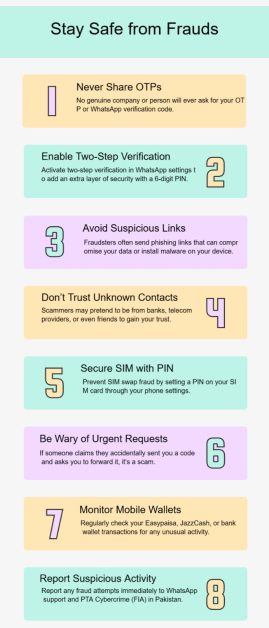
Al Baraka Goes Digital with PTCL Partnership Deal
July 25, 2025
PTA Pushes Telcos to Weather the Storm
July 25, 2025As digital adoption rises, so do threats—experts call for stronger safeguards and public awareness
What began as a proud moment for Malik Awan—a father eager to support his daughter’s education—turned into a harrowing lesson in digital deception. Awan had just secured his daughter’s admission to an O-Level school when he received a call from individuals claiming to be from the institution. They said they were creating a WhatsApp group for parents and needed him to reset his account to be added. Moments after following their instructions, his WhatsApp was hacked.
What happened next was swift and costly. Impersonating Awan, the scammers messaged his contacts, urgently requesting money. Two of his friends, unaware of the fraud, sent Rs. 45,000 and Rs. 48,000 respectively. “My friend told me he received a message asking for money, and he thought it was me,” Awan recalled. The fraudsters had used SIMs registered under fake identities, leaving few digital traces and even fewer answers.
Awan’s case is far from isolated. In Pakistan’s rapidly digitizing economy, financial fraud via platforms like WhatsApp and Facebook has emerged as a major cyber threat. What were once tools of convenience and connection are now being weaponized for impersonation, identity theft, and unauthorized transactions.
Criminal Networks Grow More Sophisticated
Earlier this month, the National Cyber Crime Investigation Agency (NCCIA) uncovered a major fraud operation in Dunyapur, Multan. A targeted raid led to the arrest of six individuals accused of running a sophisticated scam involving fake social media profiles and digital wallet exploitation.
According to authorities, the suspects used fraudulent WhatsApp accounts and Facebook profiles to impersonate trusted individuals, lure victims, and solicit sensitive data or cash transfers. These funds were rerouted through mobile wallet services like JazzCash and Easypaisa, further obscuring their trail. Six mobile phones were seized, containing evidence of fake chats and financial activity linked to the scheme.
This growing trend underscores how criminals are adapting quickly to new technologies, exploiting gaps in regulation, user awareness, and digital infrastructure.
Industry and Government Respond
As scams grow more complex, both government agencies and private operators are taking steps to protect users. The Pakistan Telecommunication Authority (PTA) actively monitors suspicious digital activity and works closely with telecom operators to block and trace numbers linked to fraud. It also urges the public to report incidents through the PTA Complaint Management System and the FIA’s Cyber Crime Reporting Portal.
Telecom and fintech companies have also stepped up efforts. JazzCash, one of Pakistan’s largest mobile wallet providers, has implemented security upgrades across its platform. “The rise in WhatsApp-based financial scams highlights the urgent need for stronger digital safeguards,” said Aamir Aftab, Chief Product Officer at JazzCash. “We’ve introduced multi-factor authentication, transaction alerts, and real-time fraud monitoring. We’re also working closely with regulators to trace suspicious activity and strengthen our fraud prevention capabilities. Preventing digital fraud requires a united front, and we remain committed to playing our part.”
Public awareness campaigns are another key element of the response. Telecom operators routinely issue SMS advisories warning customers not to share one-time passwords (OTPs), PINs, or wallet credentials—even with people they trust. Some have introduced built-in fraud detection tools to flag suspicious behavior and lock compromised accounts.
Read more: WhatsApp Scam Alert Issued by PTA
Toward a Safer Digital Ecosystem
While the actions of regulators and service providers are crucial, experts say long-term success depends equally on user education. “The average Pakistani smartphone user now handles bills, bank transfers, and business communication through digital channels,” noted a senior NCCIA official. “That makes digital literacy a form of self-defense. Every citizen needs to know how to spot red flags and protect themselves.”
Cybersecurity experts emphasize that even basic safety practices—like enabling two-step verification on WhatsApp or monitoring mobile wallet activity—can stop many attacks before they begin.
How to Protect Yourself from WhatsApp and OTP Scams
- Never share OTPs or verification codes.No legitimate company will ask for them.
- Enable two-step verification on WhatsApp.Add a six-digit PIN for extra protection.
- Avoid clicking on suspicious links.These may install malware or steal data.
- Don’t trust unknown callers or urgent money requests.Always verify.
- Secure your SIM card with a PIN.Prevent SIM swap fraud via phone settings.
- Be cautious if someone says they mistakenly sent you a code.It’s likely a scam.
- Monitor your JazzCash, Easypaisa, or bank wallet activity regularly.
- Report fraud attempts.Use WhatsApp support, the PTA CMS, or the FIA portal.
- Educate family and friends.Fraud spreads fastest through trusted contacts.
- Keep your apps updated.Always use the latest versions for better protection.

How to be Safe from WhtsApp Fraud
The Road Ahead
As Pakistan continues its digital transformation, building a secure ecosystem will require more than just technology. It calls for collaboration across regulators, telecom companies, fintech providers, and the public. With coordinated action, robust security protocols, and continuous awareness efforts, Pakistan can turn its growing digital economy into a safe and trusted space for all.






